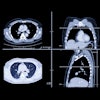Successful AI implementation requires strong leadership and robust governance structures to oversee algorithm evaluation, deployment, and ongoing maintenance, steering the transition from static to continuous learning systems, according to a new special report from a German-U.S. team.
 Barbara Wichtmann, MD.
Barbara Wichtmann, MD.
"Leaders need to understand not only the technical aspects but also the complex human, administrative, and organizational challenges of AI’s implementation," noted Barbara Wichtmann, MD, a radiologist and medical physicist at University Hospital Bonn, Germany, and her colleagues at Mass General Brigham in Boston. "Establishing sound governance and organizational frameworks will be essential to ensure ethical compliance and appropriate oversight of AI algorithms."
They can envision the creation of a "diagnostic cockpit" that makes it possible to harness multidimensional data to generate comprehensive insights and personalized treatment strategies, but realizing this vision relies on interdisciplinary collaboration and visionary leadership from within the medical imaging community that fosters innovation, they wrote in an article posted on June 27 by European Radiology.
"Key steps will include the evaluation and clinical validation of AI systems, a transformative process that must be primarily driven and advanced by academic radiology, working in close collaboration with private practices that handle a large portion of patient care," Wichtmann and her colleagues explained.
 Leveraging its strengths in automation, accuracy, and objectivity, AI can optimize every step of the diagnostic imaging workflow, from coordination to imaging, diagnostics, reporting, and data-driven analytics. A strong leadership and governance framework will be needed to ensure ethical oversight and interdisciplinary collaboration. This balanced approach supports the sustainable integration of AI across the imaging enterprise, from operational efficiency to diagnostic accuracy and predictive analytics, enabling more efficient, precise, and human-centered care. Figure courtesy of Barbara Wichtmann, MD, et al and European Radiology.
Leveraging its strengths in automation, accuracy, and objectivity, AI can optimize every step of the diagnostic imaging workflow, from coordination to imaging, diagnostics, reporting, and data-driven analytics. A strong leadership and governance framework will be needed to ensure ethical oversight and interdisciplinary collaboration. This balanced approach supports the sustainable integration of AI across the imaging enterprise, from operational efficiency to diagnostic accuracy and predictive analytics, enabling more efficient, precise, and human-centered care. Figure courtesy of Barbara Wichtmann, MD, et al and European Radiology.
As radiology advances toward this AI-driven future, leaders must cultivate an environment where technology enhances rather than replaces human skills, upholding an unwavering commitment to human-centered care, they continued. The leaders’ vision will define radiology’s pioneering role in AI-enabled healthcare transformation.
"Visionary leaders must harness AI to enhance, rather than replace, the role of professionals in radiology, advancing human-centered care while pioneering healthcare transformation," the researchers pointed out, adding that human qualities such as creativity, empathy, and emotional intelligence will remain crucial in medical care. "By relieving radiology professionals of lower-value routine tasks, AI holds the potential to reduce burnout while preserving or potentially strengthening the role of radiologists in patient care."
Just as can be seen in dating and relationship apps, AI may also offer a way to reshape recruitment practices and facilitate optimal mentoring pairing.
"The next generation of radiologists will depend on leaders who possess a solid understanding of AI concepts and practical experience in their development and integration, aiming to enhance clinical utility and improve patient outcomes," they stated.
A key objective will be the cultivation of an ecosystem supported by professional societies, industry, and government bodies that enable close collaborations between clinicians and scientists, driving foundational and translational AI research in radiology, according to the authors. "A vital leadership quality will be to build consensus and create institution-wide buy-in and investment in AI by building cross-departmental and cross-disciplinary partnerships."
Overall, radiology leaders must ensure innovation thrives by celebrating successes and fostering a culture of continuous learning that embraces diversity and inclusion through tailored curricula, mentoring, and coaching initiatives, they wrote. "While the upcoming changes, along with the infrastructure and investments required for the clinical implementation of AI, will undoubtedly present many challenges, we can expect that this transformation will greatly benefit our field and position us as pioneers in expanding medical practice through AI."
As a follow-up to this report, the authors are focusing on workflow efficiency and AI integration in radiology, Wichtmann told AuntMinnie. They have published two related articles: "Impact of optimized and conventional facility designs on outpatient abdominal MRI workflow efficiency," published in Nature, and "Enhancing MRI efficiency in musculoskeletal examinations: Impact of optimized facility design and workflow optimization efforts," published in European Journal of Radiology.
You can read the full European Radiology article here.




















